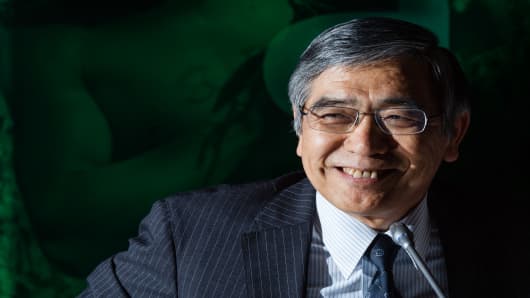Japanese Prime Minister Shinzo Abe has nominated Haruhiko Kuroda, the current head of the Asian Development Bank, to be the new Bank of Japan (BOJ) Governor. This is a bold move that should allow Japan to press the "reset" button on its monetary policy.
I believe he's likely to succeed where other BOJ governors have not and make some progress in defeating deflation. At least, he should make some progress in weakening the yen. Here's why.
Kuroda has been a long-time critic of the central bank's monetary policies throughout his career in the finance ministry, in academia and in his current position. He wrote a book titled "Success and Failure in Fiscal and Monetary Policy" in which he blames the BOJ for a variety of monetary mistakes ranging from being too accommodative during the Bubble Era of the late 1980s to being too restrictive in the early part of this century.
(Read More: Kuroda Signals Aggressive Monetary Policy Coming)
One of the newly nominated deputy governors, Professor Kikuo Iwata, goes even further. A professor of economics at Gakushuin University, he has been a consistent critic of the BOJ since the early 1990s, when he engaged in a public debate with a senior BOJ official over monetary policy in a respected Japanese economic magazine. Just last year he published a book entitled "The Guardian of Deflation," his disparaging nickname for the BOJ. He recently declared that "the BOJ needs a regime change."
That drive for "regime change" is the main reason I think these two may succeed. All organizations have a "house view," a consensus that develops over time on how to deal with problems. Of course there are internal debates, and the BOJ, with outsiders sitting on its Monetary Policy Board, probably has more such debates than many other institutions. Yet there has been a consistent official view that deflation cannot be defeated by monetary means. And changing the "house view" in Japan is even more difficult than changing it in other organizations.
The problem is the role that continuity and precedent play in the Japanese bureaucracy. According to the late Japanese psychiatrist and cultural critic Dr Masao Miyamoto, "continuity is the most important concept for the bureaucrats." That's because changing policy is tantamount to saying that the people who set policy before were wrong, and that just isn't done in a hierarchical organization where one's career can depend on the help of those who are more senior to you.




